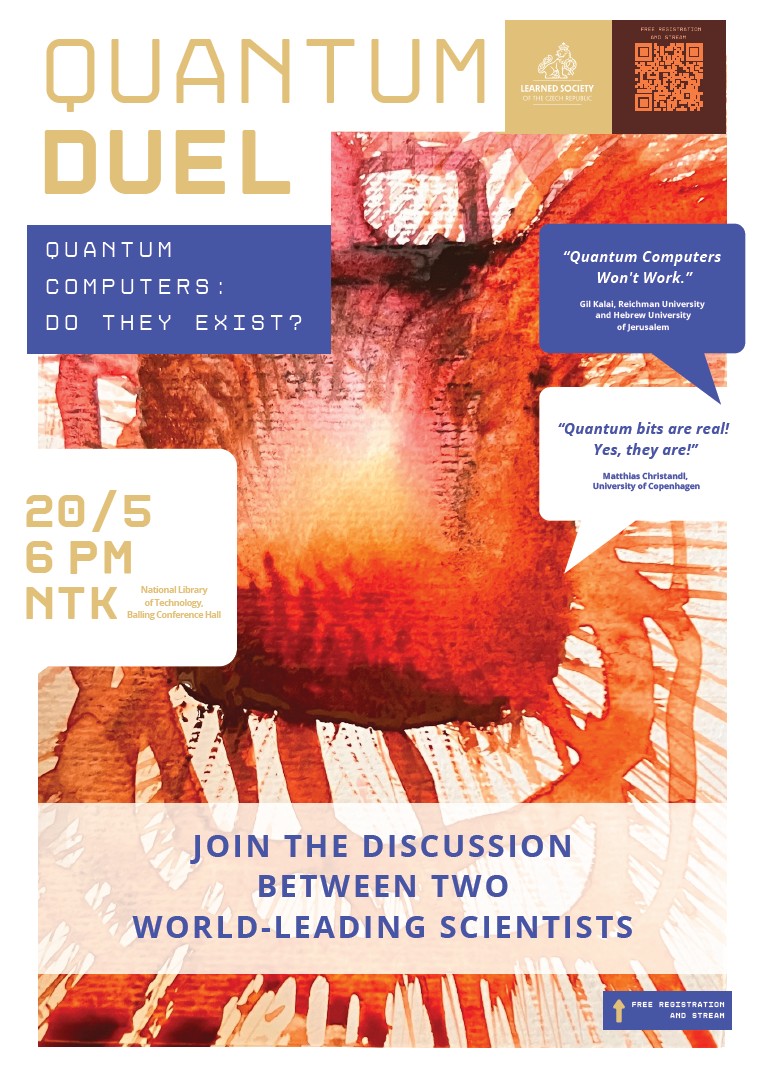17.04.2025
Quantum Duel: Quantum computers – Do they exist? (20 May, 2025)
The Learned Society of the Czech Republic is hosting a discussion on whether we will ever have practically relevant quantum computers.
Matthias Christandl from the University of Copenhagen argues that qubits (units of information that are “both 0 and 1 at the same time”) have already been created, and that this will lead to the development of useful quantum computers.
Gil Kalai from the Reichman University and the Hebrew University of Jerusalem does not dispute the creation of qubits, but he argues that, because of their inherent properties, we will never have practically relevant quantum computers.
- Tuesday, 20 May, 2025, 6:00 PM
- Balling Conference Hall, National Library of Technology, Technická 6, Prague 6
- Free admission, registration required – PLEASE, REGISTER HERE
- YouTube stream: youtube.com/live/ykBkZB8JiCg
 Quantum computing is a computational model based on the principles of quantum physics. For certain computational tasks, ideal quantum computers are expected to outperform classical digital computers by many orders of magnitude, potentially rendering most current cryptosystems obsolete. While quantum computing presents an exciting vision for future technology, there is ongoing debate about its feasibility. Indeed, when or even whether scalable quantum computation is possible remains one of the most important scientific questions of our time.
Quantum computing is a computational model based on the principles of quantum physics. For certain computational tasks, ideal quantum computers are expected to outperform classical digital computers by many orders of magnitude, potentially rendering most current cryptosystems obsolete. While quantum computing presents an exciting vision for future technology, there is ongoing debate about its feasibility. Indeed, when or even whether scalable quantum computation is possible remains one of the most important scientific questions of our time.
Matthias Christandl
University of Copenhagen
Quantum bits are real! Yes, they are!

Quantum mechanics allows us to have a unit of information to hold "0" and "1" at the same time, called quantum bits or qubits. As our understanding of the universe, information in the brain and computer technology are based on the traditional concept of bits that can only be either "0" or "1", qubits have the potential to profoundly change our understanding of everything around us. Can cats be alive and dead at the same time? (Schrödinger) Are we living in a multiverse, where different universes branches interfere like light does? (Deutsch, 1980s) Can we build a quantum computer? (Feynman, Deutsch 1980s)
Whereas the first two questions are hard to address, the last one is a tangible task, the research and industry have embarked on with big enthusiasm and money. The first small and noisy quantum bit have been built, yes, quantum bits are real! For a full-scale quantum computer, we need more and better qubits. This is difficult to achieve. Very difficult, but I will argue that there are no theoretical obstacles that we know of — and that the research is well on-track!
Gil Kalai
Reichman University and Hebrew University of Jerusalem
Why Quantum Computers Won't Work

I argue that building scalable quantum computers — and even achieving significant early milestones in quantum computation — is fundamentally impossible. My theory posits that intermediate-scale quantum computers are intrinsically noisy systems. Their robust components exhibit only a low-level (classical) computational capability, and they inherently display noise-sensitive behavior. These characteristics suggest that, for intermediate-scale quantum systems, neither a demonstration of "quantum computational supremacy" nor the implementation of high-quality quantum error-correcting codes is achievable. Consequently, this implies that large-scale quantum computers based on quantum error correction are fundamentally unattainable.
Quantum bits (qubits) are real, and there are multiple physical ways to implement them! However, qubits are inherently noisy, and my argument presents a theoretical obstacle to achieving stable qubits and other near-term goals in quantum computation.